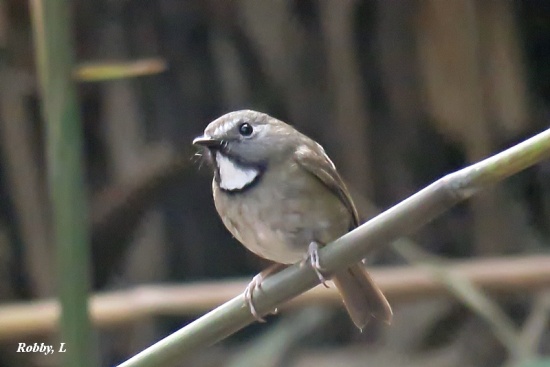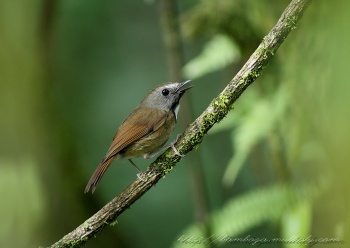(GSearch amended to allow for both scientific names) |
(Clearer image. All sections now started. References updated. Incomplete gone) |
||
| Line 1: | Line 1: | ||
| − | + | [[Image:White-gorgeted Flycatcher 1.JPG|thumb|550px|right|Photo by {{user|robby+thai|robby thai}}<br />Doi Phu Hom Pok NP, [[Thailand]], March 2017]] | |
| − | [[Image:White- | ||
;[[:Category:Anthipes|Anthipes]] monileger | ;[[:Category:Anthipes|Anthipes]] monileger | ||
''Ficedula monileger'' | ''Ficedula monileger'' | ||
==Identification== | ==Identification== | ||
| + | 11·5–13 cm (4½-5 in) | ||
| + | *Olive-brown head and upperparts | ||
| + | *White throat | ||
| + | *Short tail | ||
==Distribution== | ==Distribution== | ||
| − | [[ | + | [[Image:White-gorgeted_Flycatcher.jpg|thumb|350px|right|Photo by {{user|bambuza|bambuza}}<br />Chiangmai, [[Thailand]], June 2009]] |
| − | + | [[Asia]]: found in [[China]], [[Tibet]], [[Nepal]]<br /> | |
| + | '''South Asia''': [[India]], Eastern and Western [[Himalayas]], [[Bangladesh]], [[Bhutan]], [[Indochina]], [[Myanmar]], [[Laos]], [[Vietnam]], and [[Thailand]] | ||
==Taxonomy== | ==Taxonomy== | ||
Formerly placed in genus [[:Category:Ficedula|Ficedula]]. | Formerly placed in genus [[:Category:Ficedula|Ficedula]]. | ||
| + | ====Subspecies==== | ||
| + | There are 3 subspecies<sup>[[#References|[1]]]</sup>: | ||
| + | *''A. m. monileger'': | ||
| + | :*[[Himalayas]] of [[Nepal]] to [[Bhutan]] and north-eastern [[India]] (Arunachal Pradesh) | ||
| + | *''A. m. leucops'': | ||
| + | :*North East India to southern [[China]] (Yunnan), [[Myanmar]], [[Thailand]] and northern [[Vietnam]] | ||
| + | *''A. m. gularis'': | ||
| + | :*Myanmar (Arakan Yoma Mountains) | ||
| + | |||
==Habitat== | ==Habitat== | ||
| − | + | Humid broadleafed forests, scrubby ravines, thick bushes and streams with luxuriant vegetation. | |
==Behaviour== | ==Behaviour== | ||
| + | A shy skulking species. | ||
| + | ====Diet==== | ||
| + | Their diet is not well documented, though includes small invertebrates. They forage alone, or in pairs. | ||
| + | ====Breeding==== | ||
| + | Their nest is ball, constructed from grass and leaves; it is placed in the undergrowth. | ||
==References== | ==References== | ||
| − | #{{Ref- | + | #{{Ref-Clements6thAug16}}#Avibase |
| + | #Handbook of the Birds of the World Alive (retrieved April 2017) | ||
{{ref}} | {{ref}} | ||
==External Links== | ==External Links== | ||
Latest revision as of 21:52, 13 April 2017
- Anthipes monileger
Ficedula monileger
Identification
11·5–13 cm (4½-5 in)
- Olive-brown head and upperparts
- White throat
- Short tail
Distribution
Asia: found in China, Tibet, Nepal
South Asia: India, Eastern and Western Himalayas, Bangladesh, Bhutan, Indochina, Myanmar, Laos, Vietnam, and Thailand
Taxonomy
Formerly placed in genus Ficedula.
Subspecies
There are 3 subspecies[1]:
- A. m. monileger:
- A. m. leucops:
- A. m. gularis:
- Myanmar (Arakan Yoma Mountains)
Habitat
Humid broadleafed forests, scrubby ravines, thick bushes and streams with luxuriant vegetation.
Behaviour
A shy skulking species.
Diet
Their diet is not well documented, though includes small invertebrates. They forage alone, or in pairs.
Breeding
Their nest is ball, constructed from grass and leaves; it is placed in the undergrowth.
References
- Clements, J. F., T. S. Schulenberg, M. J. Iliff, D. Roberson, T. A. Fredericks, B. L. Sullivan, and C. L. Wood. 2016. The eBird/Clements checklist of birds of the world: v2016, with updates to August 2016. Downloaded from http://www.birds.cornell.edu/clementschecklist/download/
- Avibase
- Handbook of the Birds of the World Alive (retrieved April 2017)
Recommended Citation
- BirdForum Opus contributors. (2024) White-gorgeted Flycatcher. In: BirdForum, the forum for wild birds and birding. Retrieved 10 June 2024 from https://www.birdforum.net/opus/White-gorgeted_Flycatcher





